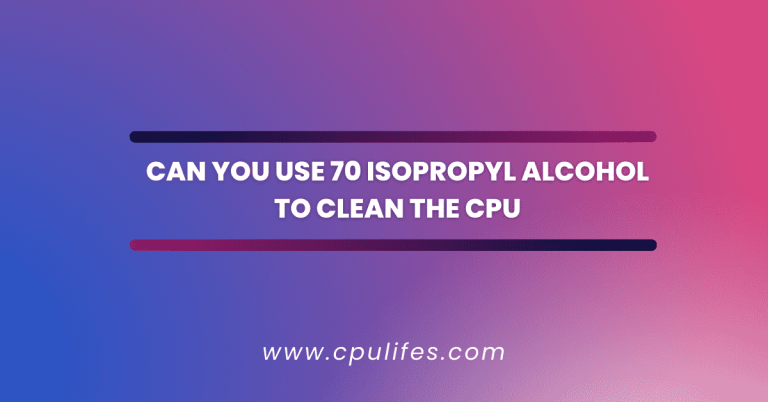Does CPU Affect Gaming – Ultimate Complete Guide In 2023
One of the most critical components of a gaming PC is the CPU, and it is essential to understand how it affects your gaming experience. Does the CPU affect gaming? All these queries will be discussed in detail in the following article:
CPUs manage many elements that make gameplay more realistic and world-building more comprehensive. From frame rate to graphics processing, the CPU is responsible for many aspects of a game.
It also helps with multitasking, allowing you to run multiple programs at once without lag. Knowing exactly how CPUs affect your gaming experience makes you both a better PC owner and a more conscientious gamer.
You can ensure your CPU is up to date and running at its peak performance so you get the most out of your gaming experience. With the right CPU, you can enjoy a smooth and immersive.
What Does The CPU Do For Gaming?
The CPU is an essential component of gaming, as it processes all of the actions taken in the game and transmits the data to the GPU for further processing. Without the CPU, the GPU would be unable to work, thus rendering the game unplayable.
However, if the CPU is too weak, it can bottleneck your PC and negatively impact your game’s framerate.
The CPU is also responsible for handling other tasks, such as audio and input, making it a vital component of any gaming system.
In summary, the CPU is an essential part of gaming and is responsible for processing game data and transmitting it to the GPU for further processing.
How Much Difference Does A CPU Make In Gaming?
In today’s gaming landscape, open-world games with lots of AI require a decent processor to get the most out of the experience.
Entry-level processors may be able to handle the load, but having a higher-end CPU can make a significant difference in terms of frames per second. In some cases, upgrading to a better processor can boost FPS by up to 30.

This can make a massive difference in the gaming experience, with smoother and more responsive gameplay.
Additionally, having a better CPU can help reduce stuttering and lag, making the game more responsive and enjoyable. Ultimately, a CPU’s difference in gaming depends on the specific game.
Will Upgrading The CPU Improve Gaming Performance?
The amount of GPU usage is a significant factor in determining whether upgrading your CPU will improve gaming performance. If your GPU usage is close to 80-90%, upgrading your CPU will increase your frame rate, but not by much.
However, if your GPU usage is closer to 50%, upgrading to a better CPU could double your frame rate.
So, the answer to the question, ‘Will upgrading the CPU improve gaming performance?’ is yes, but it depends on the amount of GPU usage.
If the GPU usage is high, then the performance improvement may be insignificant, but if the GPU usage is low, an upgrade in the CPU could make a significant difference.
Which One Between The GPU And The CPU Does The Most Work While Gaming?
The GPU and the CPU are both essential components of a gaming system, but in many cases, the GPU does more work than the CPU when playing certain games.
The GPU is a single-chip processor responsible for managing and enhancing video and graphics performance.
It can handle complex tasks such as rendering 3D graphics and applying special effects to the visuals. Compared to the CPU, the GPU can process data much faster and is designed to handle graphics-intensive tasks.
Therefore, when it comes to gaming, the GPU is often the component that does the most work. As a result, it is crucial to have a powerful GPU to get the best performance out of your gaming system.
Does The CPU Affect The Gaming Performance In A PC Or Only The GPU?
The answer is both. Both the CPU and GPU are essential for gaming performance. The CPU is responsible for the PC’s overall performance, while the GPU is responsible for graphics processing.
A powerful CPU can help reduce loading times, run multiple tasks simultaneously, and improve the PC’s performance.
On the other hand, a powerful GPU can handle more complex graphics and enhance the game’s visual quality.
But the question of how much they affect gaming performance depends on the type of game and what it will be used for.
For example, if a game requires a lot of processing power, the CPU will be more important than the GPU.
However, the GPU will be more important for games requiring a lot of graphical power. Both the CPU and GPU are essential in their own right when it comes to gaming performance.
How Much Does A Cpu Affect Gaming Performance?
A CPU’s clock speed is a significant factor in determining how well it can handle gaming. The higher the clock speed, the more cycles per second the CPU can process and the more instructions it can process each second.
This means that a CPU with a faster clock speed can process more game instructions each second, resulting in higher in-game FPS.
Modern midrange and high-end CPUs are very fast, often up to close to 5GHz while gaming. This lets them handle more game instructions each second, improving in-game performance.
Therefore, a CPU’s clock speed is an essential factor in gaming performance, as it can significantly impact it.
How The CPU Affects Your Gaming Experience:
Regarding gaming, the number of cores in your CPU can significantly impact your framerate. More cores mean more processing power, which translates to better performance.
However, more than not about having more cores, certain aspects of the game, such as AI processing, are more difficult to parallelize and thus require a more powerful CPU.
This means that having a CPU with a higher clock speed and more cores can help you get the best framerate possible. Having faster RAM and a dedicated GPU can also help you get the most out of your gaming experience.
Ultimately, the more cores your CPU has, the better framerate you get, but it is essential to consider all.
Can CPU Temperature Affect Gaming?
Yes, it can. CPU temperatures can increase significantly while gaming, and this can cause different problems, including hardware failure.
Gamers should be aware of this and take steps to prevent it. The best way to do this is to install a cooling system designed for PCs.
This can help keep the CPU temperature down and prevent overheating. Additionally, it is crucial to ensure the computer is well-ventilated and the fans are running correctly.
These steps can help ensure that the CPU temperature stays at a reasonable level while gaming and that hardware problem are avoided.
Is 100% CPU Usage Harmful To Gaming?
Generally, CPUs are designed to run safely at 100% CPU utilization. However, this may cause perceptible slowness in your games. If you are experiencing any slowdowns or lag while playing, it is likely due to an overloaded CPU.
As a result, you should avoid these situations whenever possible. To do this, you can reduce the number of background processes running on your computer or switch to a lower-end game optimized for your hardware.
Additionally, you should consider upgrading your hardware if you are having trouble running more demanding games.
Ultimately, 100% CPU utilization is not necessarily harmful to gaming, but it can lead to performance issues if your hardware is
Conclusion:
Absolutely! A CPU, or Central Processing Unit, is the heart of a computer and plays a significant role in gaming.
It processes the game’s graphics, sound, and other elements, allowing for a more immersive experience.
CPUs are responsible for calculating the AI of non-player characters, allowing for a more sophisticated gaming experience.
Related Posts:






